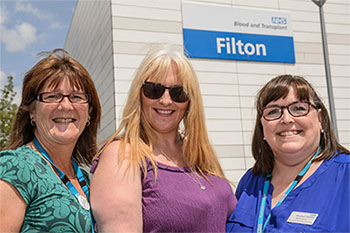Bristol Eye Bank opens with appeal for donors to meet shortage
Bristol’s new state of the art eye bank has officially opened today (June 14) with an appeal for more people from the city to give the gift of sight.
Bristol is one of several areas around the country where NHS Blood and Transplant is seeking help for a national shortage of cornea donors.
NHS Blood and Transplant needs around 70 donors from across the UK every week to meet demand for sight-saving transplants.
Bristol has been chosen for support because it is home to several sight saving medical teams and has good numbers of potential donors. Corneas do not necessarily stay in the area they are donated in but can be transplanted into patients around the country.
The new eye bank officially opened in a state of the centre facility at NHS Blood and Transplant’s Filton centre on Wednesday June 14.
The eye bank was previously based at the Bristol Eye Hospital, and moved location following the consolidation of Tissue and Eye Services within NHS Blood and Transplant.

The modern new facility provides a high quality setting for the preparation of sight saving grafts helping patients see what they can currently only imagine.
Helen Gillan, General Manager of Tissue and Eye Services for NHS Blood and Transplant said: “Donating sight means there can be light after darkness.
“Transplants help restore the sight of around 4,000 people across the UK every year.
“But more donors are needed and people in Bristol can help us by saying yes to cornea donation.
“More than nine out of ten Bristol residents on the Organ Donor Register have agreed to give the gift of sight. However many people are not still aware of cornea donation.”
NHS Blood and Transplant will be working particularly closely with University Hospitals Bristol NHS Foundation Trust to ensure as many families as possible are offered to donate their loved one’s sight.
The trust’s hospitals will electronically notify NHS Blood and Transplant of every death, so that families of potential donors can be contacted where appropriate. Bereaved families will also routinely be given a leaflet about tissue donation.
As well as Bristol Eye Bank, Filton is home to one of NHS Blood and Transplant’s specialist tissue and cornea retrieval teams.
Bristol eye bank collects and supplies corneas for the midlands and the south of the country, while NHS Blood and Transplant’s Manchester eye bank collects and supplies corneas for the north.
Bristol Eye Hospital performs around 120 transplants a year with corneas supplied by NHS Blood and Transplant.
Marion Jones, a nurse practitioner covering the south west and south Wales, is based at Filton, and works with staff and patients across the region to increase donation rates.
She said: “Almost anyone can donate their sight.
“Even if you can’t donate your organs, you could transform lives through the gift of sight. You are more likely to be able to donate your corneas than your organs.
“Families who have donated tell us that helping others when their relative died has brought them a sense of pride and comfort.”
The national shortage of donations means patients around the country can wait months for a transplant.
Tracey Foster needed a white stick by the time she had her life changing cornea transplants.
Tracey, 45, from Patchway in Bristol, has keratoconus and had a transplant in her left eye in 2000 and in her right eye in 2003.
The mum of three said: “I couldn’t see people’s faces. I couldn’t see at all, really.
“My whole life has changed since the transplants. I wouldn’t have been able to see my three children grow up. It would have been awful.”
Tracey now works as an inclusion manager for Bradley Stoke Community School, helping children with additional needs.
“I would say to people, please consider donating your sight. It makes a massive difference to people.”
Catherine Andrews from Stoke Gifford waited 10 months before receiving a transplant at Bristol Eye Hospital this April.
She has the degenerative eye condition keratoconus, which causes the corneas to thin.
Catherine, now aged 51, said: “I have got better eyesight now at 51 than when I was in my mid 20s.”
Catherine, a medical secretary for the NHS, added: “I would like to write to the donor’s family and thank them, to say how grateful I am for giving me a new lease of life.
“I would also like to thank the clinical team at the Bristol Eye Hospital, everybody was so kind and caring.”
Ali Cooper, 56, from Westbury on Trym, agreed to donate her husband’s corneas after he died aged 38 from a heart attack during rugby training.
Nigel was doing pre-season training for Bristol Aeroplane Company RFC, known as BAC RFC, when he collapsed at the top of a hill on Filton Golf Course.
Ali, who now works in workforce development for NHS Blood and Transplant, said: “I had two letters to say the corneas had been used and that two people had their sight back.
“Nurses can worry about asking about donation because of what you have been through. But the worst thing has just happened, nothing can make it worse. To be able to donate was actually a positive from a tragic situation for my family.
"I hope more people in Bristol are able to donate to help save more people's sight."
Corneas must be retrieved within 24 hours of death and must be prepared within 24 hours of retrieval. Most corneas are despatched for transplant within two weeks of being prepared. Unlike donated organs, corneas are not matched by blood group or tissue type.
Caption: Ali Cooper, Tracy Foster and Marion Jones
- For additional information please contact Stephen Bailey by calling 0151 269 7017 or emailing Stephen.bailey@nhsbt.nhs.uk or Karen Healy on 07764 280835 or karen.healy@nhsbt.nhs.uk
- For urgent out of hours enquiries please call: 0117 969 2444
Notes to editors
- NHS Blood and Transplant is a joint England and Wales Special Health Authority. We are responsible for ensuring a safe and efficient supply of blood and associated services to the NHS in England. We are also the organ donation organisation for the UK and are responsible for matching and allocating donated organs.
- Follow our organ and tissue donation campaigns on social media
- NHSBT Tissue Services is now the largest multi-tissue banking organisation in the UK. It is a significant leader in the development of national and international standards, policies and regulation in the field.

